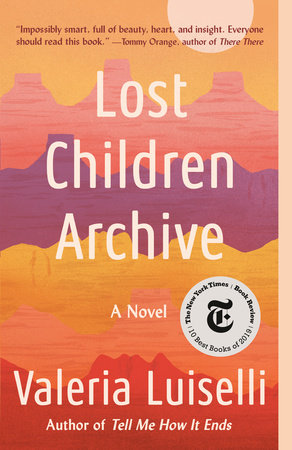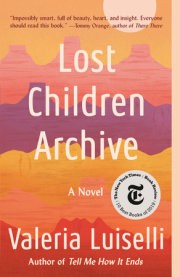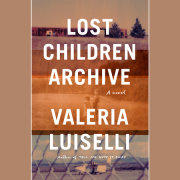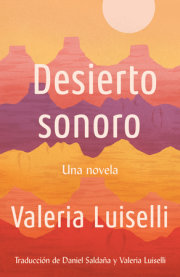“The novel truly becomes novel again in Luiselli’s hands—electric, elastic, alluring, new . . . She is a superb chronicler of children: the daughter and son feel piercingly real—perceptive, irreplaceable, wonderfully odd. The book [is] an archive of curiosities, yearnings, animated by the narrator’s restless energy . . . It breaks out of the rhythms of the road trip, into a heart-stopping climax.” —Parul Sehgal, The New York Times
“Daring, wholly original, brilliant. . .fascinating. What Luiselli has pulled off here is a twist on the great American road trip novel, a book about alienation that chronicles fractures, divides, and estrangement—of both a family and a country. It’s a remarkable feat of empathy and intellectuality that showcases Luiselli’s ability to braid the political, historical, and personal while explicitly addressing the challenges of figuring out how to tell the very story she’s telling. Luiselli is an extraordinary writer [with] a freewheeling novelist’s imagination.”—Heller McAlpin, NPR
“Pulsates with urgency and lingers with timelessness . . . If children are our future, what lies ahead for a country that fails them? Luiselli initiates a reckoning [and] audaciously stretches the bounds of storytelling. Lost Children Archive’s two kids—among the most tenderly, realistically drawn in American fiction—make this book unforgettable, down to its explosive final sentence.”
—David Canfield, Entertainment Weekly “10 Best Books of the Year So Far”
“Engrossing…constantly surprising—a beguiling mixture of the real and the doubly invented; a passionately engaged book [with] intellectual amplitude and moral seriousness, [and] a beautiful, loving portrait of children and of the task of looking after them. The kids are utterly alive, hurling questions and mangling adult signals: we are with the family, inside their Volvo wagon, or looking over their shoulders as they eat in diners and stay in motels. It is a pleasure to be a part of the narrator’s family; just as pleasurable is the access we gain to the narrator’s mind—a comprehensive literary intelligence.” —James Wood, The New Yorker
“Riveting, lyrical, virtuosic . . . There is joy in make-believe in Lost Children Archive—a novel as much about storytellers and storytelling as it is about lost children. Two texts and two journeys—one by car, meandering; the other speeding forward with the locomotive propulsion of suspenseful fiction—seem on their way to a collision; Luiselli’s most thrilling section consists of one rhythmic, delirious feat of a sentence reminiscent of Molly Bloom’s epic soliloquy in Joyce’s Ulysses. The novel bears rereading, to reveal pleasing ironies. Luiselli’s metaphors are wrought with devastating precision . . . The brilliance of the writing stirs rage and pity. It humanizes us.” —Gaiutra Bahardur, The New York Times Book Review
“Luiselli is a master. Not since Lolita has a road trip so brilliantly captured the dark underbelly of the American dream, the gulf between its promise and reality. Luiselli confronts big picture questions: What does it mean to be American? To what lengths should we go to bear witness? Will history ever stop repeating itself? All the while, her language is so transporting, it stops you time and again.” —Carmen Maria Machado, O Magazine
"A big, heady Great American Novel for our moment . . . this book, about a husband and wife on a journey to the Mexican border with their kids, is many things at once—an epic road trip through a vanished America, passing through ghost towns from Tennessee to Oklahoma and Texas; the story of one family’s quiet dissolution; and a meditation on displacement and deportation, from the final days of the Apaches at the end of the 19th century to the present crisis. . . . Keen-eyed and thoughtful, an impassioned consideration of the very nature of documentation and trauma.” —Anderson Tepper, Vanity Fair “Best Books of 2019 So Far”
“Stunning—an engaging blend of essay, travelogue and narrative. Those who read with pen in hand will find much to underline and explore. At the halfway point we turn a corner, and echoes from the past converge with the present with devastating force. Readers have been galvanized by road trips before; one thinks of Jesmyn Ward’s haunting Sing, Unburied, Sing, and the ambition and humility of James Agee’s Let Us Now Praise Famous Men. As with that brilliant and challenging book, Luiselli’s singular narrative will prove uniquely rewarding, even life-changing.” —David Brockes, The Seattle Times
“An epic road trip [that also] captures the unruly intimacies of marriage and parenthood... Luiselli’s mind is a delight; her writing shimmers like its desert setting. This is a novel that daylights our common humanity, and challenges us to reconcile our differences.” —Kristen Millares Young, The Washington Post
“An extraordinary allegory of this country’s current crisis of self-concept: Lost Children Archive [is] an inversion of the American frontier fable—its anti-myth, its interrogator. A family sets out from the relative safety of the East Coast in a wagon (here, a station wagon) in wary but hopeful search of a new home. The [mother] privately comes to think of their destination as the place where the family will discover which of its own possible trajectories will come to pass: stay together, or part. What happens when a person is lost to loved ones, to herself, to history? Can such loss be prevented? Can we be retrieved? One of Lost Children Archive’s pleasures is its resemblance to the kind of collection that emerges when a dedicated mind is at work on the same problem over the course of years. . . Luiselli’s approach is elegant and generous.” —Jordan Kisner, The Atlantic
“Lost Children Archive stimulates and surprises—it exerts a visceral tug. It begins with a fraying family [on] an epic road trip [where] the children’s voices and viewpoints infuse hope. In the sun-strafed badlands of Arizona, as ghosts of the vanquished Apache warriors crowd around, [the] first-person account converges with a tale about a band of lone children— a conceit that frames eerie, visionary passages. Stories, the mother reflects, ‘don’t fix anything or save anyone,’ but they can make the world ‘sometimes, just sometimes’—as in the case of this novel—‘more beautiful.’” —The Economist
“Luiselli uses innovative prose to tell a timeless story.” —PEN America
“Urgent, profound, and poetic, this is a modern classic in the making, one that should be considered required reading . . . Threading together a rich tapestry of heartbreaking stories is the story of [one] family on the road. As their journey continues, it becomes clear that something else is driving this family to the Arizona-Mexico border—something of much greater importance than their projects, their careers, and even themselves. Lost Children Archive asks important questions about the nature and importance of storytelling, fictional and factual. It is a layered narrative about family, immigration, justice, and hope. There is no simplicity in [the novel’s] structure, no easy ending. The story is still being written, being told, and perhaps most importantly, being heard.” —Sadie Trombetta, Bustle
“Remarkable, stunning . . . Luiselli’s writing possesses a restless intelligence that weaves disparate lives and cultures into a map of the world . . . The music this novel’s ensemble of voices creates is beautiful.” —Ismail Muhammad, Newsday
“In probing, elegant prose, Lost Children Archive maps one family’s road trip [through] a strange, beautiful, iconic landscape of gas stations, diners, and motels, [into] Apacheria, a place that contains the histories of ‘the last free peoples on the continent.’ The novel unfolds with great attention to voices, echoes and silences; it has a dreamlike rhythm that feels both urgent and reflective.” —WBUR
“A resonant Great American Novel for our time—a dense and layered novel of the Americas, evocative of Kerouac and Bolaño, Rebecca Solnit and Juan Rulfo. There [is] a counterbalance of intimacy and inventiveness to Luiselli’s writing.” —Andy Tepper, Vanity Fair
“Poignant . . . Lost Children Archive is unquestionably timely, [but] it also approaches a certain timelessness, like all great novels. It is laced with the melancholy of last things. The novel reminds us how fragile family can be . . . It [reverberates] with the headlines of the present, and the great art of the past. The maddeningly ‘relevant’ political novel is all the rage right now, but what separates Luiselli’s book from the pack is that it manages to be political without being propagandistic, rousing without any didacticism. This novel is the kind of book we need right now.” —Tyler Malone, Los Angeles Times
“Stories appear on the news, lacking in compassion, meant to inspire fear. But there are those trying to paint a fuller picture. Valeria Luiselli is one of those people. Lost Children Archive is a story, but also a response: to the articles, to literature, to the nonprofits and schools, to the American landscape, to ideas of family, and to ideas of choice. There is so much truth in this novel. In some ways, Lost Children Archive is like a love letter to literature. Luiselli is an exceptional writer who knows her craft; this is a beautiful text, in which everyone is searching for connection and reconnection—a novel asking for more consideration, more mercy, and more action.” —Abigail Bereola, San Francisco Chronicle
“However we decide what defines a Great American Novel in 2019, it must feel a lot like what’s inside Lost Children Archive. Not only because the narrative unfolds across a literal road map of the United States, or because its focus—open borders, blended families—is so painfully of the moment. But because the search for selfhood and manifest destiny seems so freshly recast in the frank intelligence and imagination of Luiselli’s telling. With song lyrics, sketches, and Polaroids, the novel drifts almost dreamlike between the personal and political, finding beguiling detours and cul-de-sacs as it goes. The kids are precisely, perfectly drawn. By its feverish climax, Luiselli isn’t just giving us a story, she’s showing us new ways to see.” —Leah Greenblatt, Entertainment Weekly
“Elegant. . . epic in its assured embrace of American history, literature, pop culture, and politics. —Maureen Corrigan, NPR
“Revelatory, simply stunning . . . a road novel driven by fierce intelligence; a breathtaking journey that builds slowly and confidently until you find yourself in a fever dream of convergences. This book is a perfect intervention for our time, but that fleeting concurrence is not why this book will be read for years to come. Luiselli is swimming in the historical currents of the great stories and myths of journey and discovery that came before. Lost Children Archive is a great American novel. It is also a great human novel.” —Rob Spillman, Guernica
“Luiselli writes like a poet. Intelligent and patient, her telling of this historical moment of walls and inhumanity breaks open the mystery that surrounds immigration, making visceral a reality that few regard when thinking about the lives involved. She is ethnographer and activist, fictionalizing political work as she is immersed in it. A heartbreaking book.”—Lucy Kogler, Lit Hub
“The spirit of Bolaño animates this novel about our American-made border crisis. What starts as fragmented narrative gives way to a suspenseful climax. Lost Children Archive is a story about all American sins.” —Boris Kachka, Vulture
“Masterful, compelling, beautifully articulated . . . a profound and unsentimental composition on exile.” —Lori Feathers, Los Angeles Review of Books
“A highly imaginative, politically deft portrait of childhood within a vast American landscape—a rollicking tale that contains within it an extremely disciplined exercise in political empathy. For her upside-down Western, Luiselli adopts the Virginia Woolf technique by which the minds of characters are linked as they watch the same objects move through the same sky. Luiselli takes the minds of children seriously, and the reader witnesses their intelligent eyes and ears recording each detail of the borderlands and registering the full terror of them. There’s no way to convey through quotation the effect of the novel’s most thrilling section, a single sentence sustained for some twenty pages near the end, which remains measured and crystalline, expertly controlling plot, setting, character, fluctuating views and moods and voices . . . Luiselli shows the reader something she wouldn’t normally see, and also maps the past onto the present in ways that can reveal hidden contours in both.” —Lidija Haas, Harper’s Magazine
“Radical, compelling: a book that is both personal and global, familial and political. Luiselli is capable of pushing the boundaries of the sentence like James Joyce and David Foster Wallace. [At] the novel’s climax, forgoing paragraph breaks, Luiselli builds a wall of prose across nineteen pages. It’s the most emotionally draining sentence that will be published this year, and, unlike a wall of concrete, her wall of prose unites the many characters’ story lines. A true literary spectacle.” —Patrick McGinty, Pittsburgh Post-Gazette
“Luiselli is one of the most fascinating and impassioned authors at work today. Lost Children Archive is a haunting hybrid of lyrical storytelling and political fury—a powerful indictment of the cruelty and inhumanity inherent in the current American immigration system, and a vital work for the Trump era.” —Dan Sheehan, Lit Hub
“Virtuosic, exhilarating . . . By the final cadence, Lost Children Archive has become not only an indictment of US immigration policy, but a requiem memorializing every child who has ever lost their right to a childhood.” —Stephanie Elizondo Griest, Texas Observer
“Lost Children Archive reads like a memory. It unfolds in vignette-like scenes and takes you deep into the head space of its narrators. Luiselli is an imaginative writer; her work as an advocate for asylum-seekers informs the novel’s skillful blend of family story and issue-driven themes. The characters join people forced to face separation and relocation to unfamiliar territory, their current situation an echo of so many others—echoes [that] will remain in the mind of the reader as well.” —Trisha Ping, BookPage
“Luiselli’s new novel maps a crumbling young family’s journey across the United States in search of the stolen home of the Apaches amid a national backlash against immigrants. Luiselli trains an analytical eye on the tropes she’s dealing with, drawing out threads that we use to define fuzzy ideas like a family, and holding them up to the light.” —HuffPost
“Powerful and timely.” —Sarah Stiefvater, PureWow
“Luiselli is a brilliant novelist . . . she gently prods us to look at America from a wider perspective, [beginning] with the myriad negotiations of family life. Luiselli’ wit and her references to sources as diverse as Paul Simon, Ezra Pound, Susan Sontag, Laurie Anderson, and Sally Mann offer regular jolts of insight and delight; the influences are seamlessly embedded, not showy. Luiselli skillfully weaves together narratives that span multiple generations, perspectives, and cultures, creating a conclusion that might best be described as a spectacular singularity.” —Sally See, Columbia Magazine
“An ambitious road-trip novel that traverses geography, ideology, and time, while exploring the dissolution of a marriage, Lost Children Archive is heartbreakingly relevant to the humanitarian crisis at the U.S.-Mexico border. Luiselli has a gift for layering on the themes while also honing in on what makes the political so personal.” —A.V. Club
“Poignant, intense, keenly timely . . . Luiselli is no stranger to inventive storytelling; [this] latest work is perhaps her most politically relevant. A couple and their children embark on a cross-country road trip from New York City to Arizona; the scale of the migrant crisis redirects their efforts. Stories of Latin American asylum seekers and the disappeared Apaches overlap and converge; themes of translation and migration resonate. This is one of few novels that fully and powerfully conveys the urgency of this unsettling situation.” —Booklist (starred review)
"Impossibly smart, full of beauty, heart and insight, Lost Children Archive is a novel about archiving all that we don’t want to lose. It is an ode to sound. Valeria Luiselli looks into the American present as well as its history: into Native American history, and the many intersections between American and Mexican history that are and have always been there. This is a road trip novel that transcends the form, while also being the perfect American road trip novel for right now. Everyone should read this book.” —Tommy Orange
“A gorgeous and vital ghost-rich soundscape, and one of the most brilliant portrayals of child-parent relationships I have ever read. Luiselli floods extraordinary light onto childhood, parenthood, the literary consciousness, and how we make sense of past and present pain. Lost Children Archive is one of the best novels I’ve read in recent years, and one of the most important.” —Max Porter, author of Grief is the Thing With Feathers
“Valeria Luiselli writes with so much intelligence and compassion and originality, her work always astonishes me. Lost Children Archive is absolutely phenomenal.” —Claire-Louise Bennett, author of Pond
“Engrossing.” —Southern Living
“A feast of language and storytelling . . . Each page [brims] with a rich alchemy of fact, fable, and the narrator’s quest to make sense of life.” —Karen Lewis, BookBrowse
“Lost Children Archive is political . . . but Luiselli doesn’t let this obscure her story about family: about a marriage coming apart and the bond between a sister and brother. She paints beautiful scenes of family and wonderful portraits of the children. It’s a road trip: there are fights, there are meltdowns, there is singing, there are pit stops; most of all, there are stories. Luiselli’s stories are special, the result of a towering intellect and a remarkable imagination.”—David Ebner, The Globe and Mail (Canada)
“A delicate, funny, effortlessly poetic account of a family’s road trip from New York to the Mexican border—wonderfully subtle [and] memorable.”—Emma Brockes, The Guardian (UK)
“Urgent, poignant . . . Luiselli tunes our ear for echoes between its different threads. Dazzlingly, compellingly she urges her readers towards a common humanity.”—Emily Rhodes, The Financial Times (UK)
“An involving and richly textured book; an engrossing portrait of a family . . . Luiselli captures children’s outlooks with sympathy, set against a shifting backdrop of seedy motels in desolate hinterlands. More narrative strands are woven into the tapestry in haunting, poetic language. [A] journey [of] fascination and sombre beauty.” —Adam Lively, Sunday Times (UK)
“Lost Children Archive is a road trip, sat squarely in that grand American tradition stretching back from Jack Kerouac and John Steinbeck to Tocqueville’s Democracy in America and the Journals of Lewis and Clark. But there is no manifest destiny here, no hedonistic, hypermasculine musk. This novel is formally elastic . . . but at its heart there is always a narrative echo of [the] process of familial world-building, or accretion and mythmaking. [Luiselli] combines moral eloquence with a willingness to play, and each literary instinct reinforces the other. In a wrenching scene in an airport car park, the two collide. The novel’s crowning achievement is its single-sentence climax—a magnificent, wheeling, twenty-page tornado of prose, and it demands a single sitting. Lost Children Archive is an object lesson in why fiction matters.” —Beejay Silcox, Times Literary Supplement (UK)
“Gripping, timely, intelligent.” —Library Journal
“Remarkable, inventive . . . A family treks south to the U.S.-Mexico border, bearing tales of the anguish of migrant families all the way down. The opening sections are thick with literary references and social critique; imagine On the Road rewritten by Maggie Nelson. But the story darkens as they witness the [families’] plight firsthand, and later, as the couple's children stumble into their own crisis. As the novel rises to a ferocious climax, Luiselli thunderously, persuasively insists that reckoning with the border will make deep demands of our emotional reserves. A powerful border story, at once intellectual and heartfelt.” —Kirkus Reviews (starred review)
“Superb, powerful, eloquent. Juxtaposing rich, poetic prose with direct storytelling, and alternating narratives with photos, documents, poems, maps, and music, Lost Children Archive explores what holds a family and society together, and what pulls them apart. The novel begins with a family embarking on a road trip, and culminates in an indictment of the tragic shortcomings of the immigration process. Luiselli demonstrates how callousness toward other cultures erodes our own. Her novel makes a devastating case for compassion.” —Publishers Weekly (starred review)











